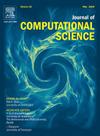具有记忆核的变阶分数扩散过程的高效数值模拟
IF 3.7
3区 计算机科学
Q2 COMPUTER SCIENCE, INTERDISCIPLINARY APPLICATIONS
引用次数: 0
摘要
扩散方程是模拟多孔介质中热量、质量或污染物传输的基础。然而,经典模型往往不能捕捉到异质和记忆依赖材料固有的异常扩散行为。为了解决这个问题,我们研究了一个分数阶扩散积分微分方程,该方程在时间和空间上都包含变阶导数,并服从适当的条件。通过对不动点定理的严格应用,证明了解的存在性和唯一性。为了有效地处理变阶分数算子和卷积型积分项,提出了一种基于有限差分的数值格式。稳定性分析证实了该方法的准确性和鲁棒性。此外,计算了三种典型情况的近似解:(i)常阶分数扩散(α=常数),(ii)随时间变化的阶α(t)和(iii)完全变阶α(x,t)。通过结合变阶动力学和积分微分结构,这项工作扩展了传统模型,并为模拟多孔介质中的复杂输运过程提供了统一的框架。本文章由计算机程序翻译,如有差异,请以英文原文为准。
Efficient numerical simulation of variable-order fractional diffusion processes with a memory kernel
Diffusion equations are fundamental in modeling the transport of heat, mass, or contaminants in porous media. However, classical models often fail to capture the anomalous diffusion behavior inherent in heterogeneous and memory-dependent materials. To address this, we investigate a fractional diffusion integro-differential equation involving variable-order derivatives in both time and space, subject to suitable conditions. The solutions are shown to exist and be unique through the rigorous application of fixed-point theorems. A finite difference-based numerical scheme is formulated to handle the variable-order fractional operators and convolution-type integral terms efficiently. Stability analysis confirms the accuracy and robustness of the method. In addition, approximate solutions are computed for three representative cases:(i) constant-order fractional diffusion (), (ii) time-dependent order , and (iii) fully variable-order . By incorporating variable order dynamics and integro-differential structures, this work extends conventional models and provides a unified framework for simulating complex transport processes in porous media.
求助全文
通过发布文献求助,成功后即可免费获取论文全文。
去求助
来源期刊

Journal of Computational Science
COMPUTER SCIENCE, INTERDISCIPLINARY APPLICATIONS-COMPUTER SCIENCE, THEORY & METHODS
CiteScore
5.50
自引率
3.00%
发文量
227
审稿时长
41 days
期刊介绍:
Computational Science is a rapidly growing multi- and interdisciplinary field that uses advanced computing and data analysis to understand and solve complex problems. It has reached a level of predictive capability that now firmly complements the traditional pillars of experimentation and theory.
The recent advances in experimental techniques such as detectors, on-line sensor networks and high-resolution imaging techniques, have opened up new windows into physical and biological processes at many levels of detail. The resulting data explosion allows for detailed data driven modeling and simulation.
This new discipline in science combines computational thinking, modern computational methods, devices and collateral technologies to address problems far beyond the scope of traditional numerical methods.
Computational science typically unifies three distinct elements:
• Modeling, Algorithms and Simulations (e.g. numerical and non-numerical, discrete and continuous);
• Software developed to solve science (e.g., biological, physical, and social), engineering, medicine, and humanities problems;
• Computer and information science that develops and optimizes the advanced system hardware, software, networking, and data management components (e.g. problem solving environments).
 求助内容:
求助内容: 应助结果提醒方式:
应助结果提醒方式:


